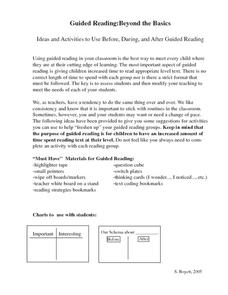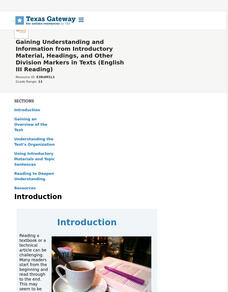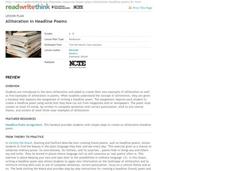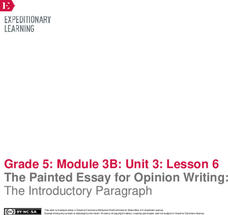Curated OER
Self-Control Meters for Volume, Space and Levels of Formality
If your pupils have difficulty producing the appropriate voice volume in various settings or respecting personal space, refer to this "control-o-meter" device. This resource includes materials to create three meters for you to clearly...
Curated OER
Mountain Range Project
This is an outline for a geography project which requires learners to research, compare, and construct a book about various mountain environments around the world. Even though this is a simple outline, it contains some useful ideas and...
Energy for Keeps
The Energy Times
Extra! Extra! Read all about past and present energy use in a classroom-made historical newspaper. Useful as a cross-curricular assignment between science, history, and language arts, the project is sure to get young journalists...
Curated OER
Inventor's Challenge
In this science worksheet, students use reference materials to complete the information for each inventor, including invention created and their nationality. They also construct a time line to illustrate the development of technology...
Curated OER
True or False ???
In this answering true or false worksheet, students read a group of questions with pictures and circle their true or false answers using references when needed. Students circle seven answers.
Curated OER
What's Your Reference
In this reference material worksheet, students choose the correct reference for each question given. Students discover the differences in the materials found in the dictionary, the almanac, the atlas, the newspaper, and the thesaurus.
Baruch College Writing Center
Summarizing, Paraphrasing, and Quoting Workshop
What's the difference between summarizing and paraphrasing? Show class members how to find the main ideas from informational text and condense it, restate it, or quote it directly with a series of educational activities based on two...
National Endowment for the Humanities
Revolution '67, Lesson 2: What Happened in July 1967? How Do We Know?
Even in a world in which dozens of participants and curious onlookers record every controversial event, the basic facts of what happened are often in dispute. Revolution '67, Lesson 2 explores 1967 Newark, New Jersey using an examination...
Ideas From Suzi
Guided Reading: Beyond the Basics
Elevate children's reading comprehension skills with this collection of guided reading resources. From paper dice with basic comprehension questions printed on them to a system for using sticky notes to identify key parts of a story,...
Premier Literacy
Point of View
Incorporate technology into a literature lesson with an innovative language arts lesson. Middle schoolers read an electronic version of original stories or fairy tales, and after determining the point of view, rewrite the tale from a...
University of North Carolina
Annotated Bibliographies
When researchers write a paper, they become curators of information. It's their job to determine the best sources of information on a topic and use those sources to inform their writing. As part of a larger series, a handout on annotated...
Apple State University
Friendly Letter Mini-Lesson
This mini-lesson plan about informal letter writing is packed with a lot of information about writing a friendly letter. Class members begin by working in pairs to answer questions after reviewing letter models. Then, take part in a...
Texas Education Agency (TEA)
Gaining Understanding and Information from Introductory Material, Headings, and Other Division Markers in Texts (English III Reading)
All teachers are teachers of reading! The 13-part interactive series ends with a lesson that teaches learners (and their instructors) how to approach reading their textbooks. After learning about several strategies, users test their...
Lakeshore Learning
Winter Bear Warm-Up
Don't be left out in the cold, ensure young learners are prepared for the winter weather with this clothing activity. After introducing them to different clothing items using the provided picture cards, students sing a song before...
Curated OER
The Boy in the Striped Pajamas: Questioning Strategy
Asking questions about the text is a great way for kids to become self-sufficient readers. Use the question-and-response strategy (QAR) to get them thinking about John Boyne's The Boy in the Striped Pajamas. After they read select...
ReadWriteThink
Alliteration in Headline Poems
Poetry is everywhere you look! Create found poems using headlines from newspapers and magazines. Young poetry focus on creating alliterative phrases with words they find in headlines, tying their poems to a central theme.
Virginia Department of Education
Identifying the Main Idea in Fiction
Discovering the main idea in fiction is like uncovering buried treasure; one must persevere to locate it, and the reward is priceless. Scholars delve deep into leveled stories using three questions to aid in identifying the main idea.
EngageNY
The Painted Essay for Opinion Writing: The Introductory Paragraph
The answer is blowin' in the wind. Using the resource, scholars read and analyze a model essay about wind power. Next, they work in groups to write an introductory paragraph that expresses an opinion about the topic.
Curated OER
Using Context
Teams practice decoding and using context strategies to determine the meanings of unfamiliar words. After verifying the meanings of words through the use of dictionaries, the Internet, thesauruses, and other sources, learners write the...
Curated OER
Using a "Before Reading" Organizer with Informational Text
Lead your students in creating a graphic organizer that uses the titles and subtitles of an informational text. Your class should recognize and use features of narrative and informational text before connecting and remembering the main...
Curated OER
Elaborating the Main Idea, Using Supporting Details
A desk is used as a visual analogy to construct the main idea and supporting details in a story. The top of the desk is the main idea, and each of the four legs provides supporting details. The legs of the desk provide support for the...
Benjamin Franklin Tercentenary
From Ben’s Pen to Our Lives
What would Ben do? Jumping off from the pseudonymous letters Ben Franklin fooled his older brother into publishing when he was still a teenager, young literary lovers dive into acting, writing, and addressing a local issue with wit and...
Indian River State College
Comma Rules and Practice
Keep those commas in line by applying the rules! Pupils can use the first page here as a reference (it includes thirteen comma rules and examples for each) as they work through the two exercises provided for practicing proper punctuation.
Curriculum Corner
Fairy Tale Unit of Study
What makes a fairy tale a fairy tale? Use a 27-page packet to supplement your next fairy tale unit. With sequencing activities, story map worksheets, character analyses and story elements graphic organizers, and fairy tale highlight...

























